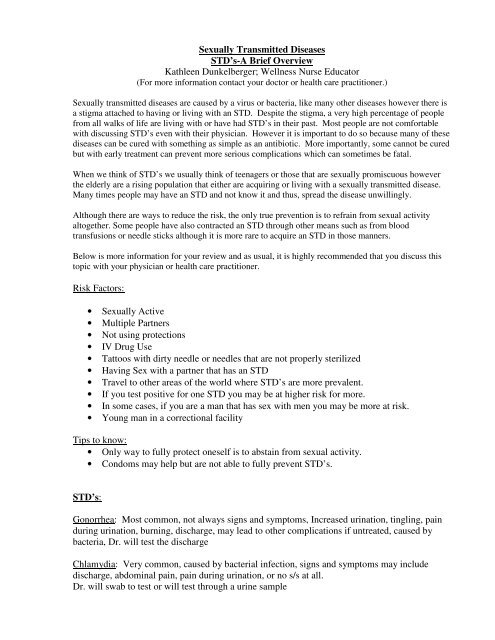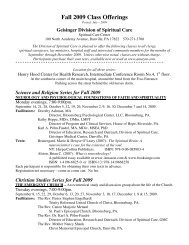Sexually Transmitted Diseases - A Brief Overview - CMSU Program
Sexually Transmitted Diseases - A Brief Overview - CMSU Program
Sexually Transmitted Diseases - A Brief Overview - CMSU Program
Create successful ePaper yourself
Turn your PDF publications into a flip-book with our unique Google optimized e-Paper software.
<strong>Sexually</strong> <strong>Transmitted</strong> <strong>Diseases</strong><br />
STD’s-A <strong>Brief</strong> <strong>Overview</strong><br />
Kathleen Dunkelberger; Wellness Nurse Educator<br />
(For more information contact your doctor or health care practitioner.)<br />
<strong>Sexually</strong> transmitted diseases are caused by a virus or bacteria, like many other diseases however there is<br />
a stigma attached to having or living with an STD. Despite the stigma, a very high percentage of people<br />
from all walks of life are living with or have had STD’s in their past. Most people are not comfortable<br />
with discussing STD’s even with their physician. However it is important to do so because many of these<br />
diseases can be cured with something as simple as an antibiotic. More importantly, some cannot be cured<br />
but with early treatment can prevent more serious complications which can sometimes be fatal.<br />
When we think of STD’s we usually think of teenagers or those that are sexually promiscuous however<br />
the elderly are a rising population that either are acquiring or living with a sexually transmitted disease.<br />
Many times people may have an STD and not know it and thus, spread the disease unwillingly.<br />
Although there are ways to reduce the risk, the only true prevention is to refrain from sexual activity<br />
altogether. Some people have also contracted an STD through other means such as from blood<br />
transfusions or needle sticks although it is more rare to acquire an STD in those manners.<br />
Below is more information for your review and as usual, it is highly recommended that you discuss this<br />
topic with your physician or health care practitioner.<br />
Risk Factors:<br />
• <strong>Sexually</strong> Active<br />
• Multiple Partners<br />
• Not using protections<br />
• IV Drug Use<br />
• Tattoos with dirty needle or needles that are not properly sterilized<br />
• Having Sex with a partner that has an STD<br />
• Travel to other areas of the world where STD’s are more prevalent.<br />
• If you test positive for one STD you may be at higher risk for more.<br />
• In some cases, if you are a man that has sex with men you may be more at risk.<br />
• Young man in a correctional facility<br />
Tips to know:<br />
• Only way to fully protect oneself is to abstain from sexual activity.<br />
• Condoms may help but are not able to fully prevent STD’s.<br />
STD’s:<br />
Gonorrhea: Most common, not always signs and symptoms, Increased urination, tingling, pain<br />
during urination, burning, discharge, may lead to other complications if untreated, caused by<br />
bacteria, Dr. will test the discharge<br />
Chlamydia: Very common, caused by bacterial infection, signs and symptoms may include<br />
discharge, abdominal pain, pain during urination, or no s/s at all.<br />
Dr. will swab to test or will test through a urine sample
Genital Herpes: Sores or an outbreak or no symptoms at all, can be transmitted even if the<br />
person has no outbreak and many times is transmitted by people that do not even know they have<br />
herpes, estimated 90% of people that have it don’t even know it, testing may include a blood test<br />
or tissue scraping if ulcers or sores are present, tests are not conclusive as some don’t detect the<br />
difference in herpes 1 or 2 (type 1 is the cold sore virus and many people have this as well)<br />
Hepatitis: Infection that harms the liver, six different strains, Hep B Risks: In addition to above<br />
risks - blood transfusion prior to 1972, share a household with someone with Hep B (do not share<br />
toothbrushes or razors as STD’s are transmitted through blood and body fluids); Symptoms<br />
include loss of appetite, fatigue, dark urine, abdominal pain, Nausea and Vomiting, yellow eyes<br />
or skin, joint pain or perhaps no signs or symtpoms at all., Blood test to determine, more tests if<br />
positive such as ultrasound or biopsy of liver, may lead to more liver problems if not treated,<br />
treatment depends on severity and when noted and may include meds or liver transplant or riding<br />
it out on bed rest.<br />
Syphilis: Bacterial infection that can attack the skin, mucous membranes, genitals, brain and<br />
heart, seeing a rise in this in men that have sex with men, s/s include painless sore or sores to<br />
begin with which may later appear in a rash form anywhere on body including soles and palms,<br />
fever, swelling of lymph glands in groin area, fatigue, soreness or aching, symptoms may<br />
disappear but disease will remain if untreated leading to more severe neurological and heart<br />
problems and can cause death if untreated; Can be transmitted through kissing and infected<br />
sores, mother to baby during pregnancy, blood transfusions, usually transmitted through intimate<br />
contact only as the bacteria is very sensitive to light etc., testing would include scraping of the<br />
sores or blood tests which would determine need for further testing if the disease has progressed<br />
to heart or neurological effects, Treatment includes antibiotics<br />
HPV: Human Papillomavirus: A name for a group of over 100 related hpv; Infection can be<br />
transmitted even when a person has no symtpoms, some of these virus’ cause cervical cancer as<br />
well, about 50% of men and women contract some form of HPV and up to 80% of women by<br />
age fifty-test by papsmear or pat test, DNA test, HPV test is collected by brushing from the<br />
cervical canal, if a negative pap and negative hpv dna test you are at low risk, hpv infections that<br />
clear up on their own are common in younger woman under thirty, low risk hpv can cause genital<br />
warts and high risk cancer, no hpv test is available for men with the exception of visual<br />
inspection or biopsy of genital warts if they are present. Vaccine is available for girls and young<br />
women but this only protects against two strains that cause 90% of genital warts<br />
Genital Warts: A form of HPV, sometimes not treated as may go away on their own, some<br />
topical applications are available through the physician, warts on the genital area should not be<br />
treated with over the counter wart remover, inform your practitioner as may require testing for<br />
precancerous and cancerous conditions, even if they disappear you are still infected with the<br />
virus, some people have warts return others do not.<br />
HIV: Virus that attacks bodies immune system (Human Immunodeficiency Virus), the term<br />
AIDS (Acquired Immunodeficiency Syndrome) is used to describe last stages of the disease,<br />
38.6 million people in our world have HIV according to some sources, Symptoms vary, could<br />
have no symptoms initially and for years, but more commonly symptoms include: flu like such<br />
as fever headache, sore throat, swollen lymph glands, rash. Symptoms can progress to be more<br />
severe such as fever, chills, wt loss, diarrhea etc. Will be more prone to other infections since<br />
the HIV is attacking the immune system, Can be infected through sexual contact, mother to baby<br />
during pregnancy, un-sterile and contaminated dental instruments, Drug use with needles, blood
transfusions (USA has better screening in the past decade but some countries do not), accidental<br />
needle sticks<br />
Testing can be done at clinics, doctor officers or hospitals and many times is either covered by<br />
insurance or free, mandatory reporting is necessary so if you test positive it must be reported<br />
even without your consent, testing can be done by blood or oral mucous for the antibody. Many,<br />
many other diseases and infections are associated with HIV since the immune system is affected.<br />
Medications are used for treatment but there is no cure.<br />
Discussing STD’s with your MD or practitioner:<br />
• Not something that may be initiated by the MD so you may have to bring it up<br />
• Even if you don’t have symptoms but have concerns due to risk factors or history this<br />
should be discussed with your MD or practitioner<br />
• Testing is done on individualized basis and history is considered<br />
• If symptoms are present testing should be done<br />
• Screenings can be annually for someone that is sexually active<br />
• Voluntary HIV testing can also be done at least one time and moreso depending on the<br />
sexual history and activity especially if you are considered high risk<br />
• Testing can be done via a pap-smear, swabbing, urine or blood tests<br />
• Many insurance companies pay for testing but this needs to be discussed as well<br />
• If you test positive expect to experience a variety of emotions and consider some<br />
counseling to help you deal with these. Some STD’s are very common so please know<br />
this and that you are not alone. Talk with your doctor and it is also recommended that<br />
you inform your partner(s) so they can receive treatment to prevent more serious risks<br />
and problems that may develop if left untreated.<br />
For more information on sexually transmitted diseases please contact your physician, practitioner<br />
or a local clinic. Much information is also available on the internet including support numbers<br />
and groups. The health clinic in your area should also be able to assist you with questions.<br />
Wellness Information and Webpage by Kathleen Dunkelberger Nursing Consulting Services, LLC<br />
This information is for informational and educational purposes only and is not intended to be medical advice. As<br />
with any program or information, all individuals are encouraged to seek the advice of their medical practitioner<br />
prior to starting or changing any typical practices and for further information regarding their questions, concerns<br />
or symptoms.




